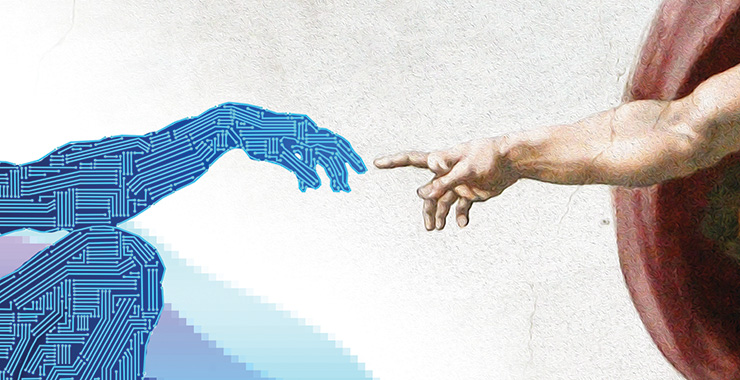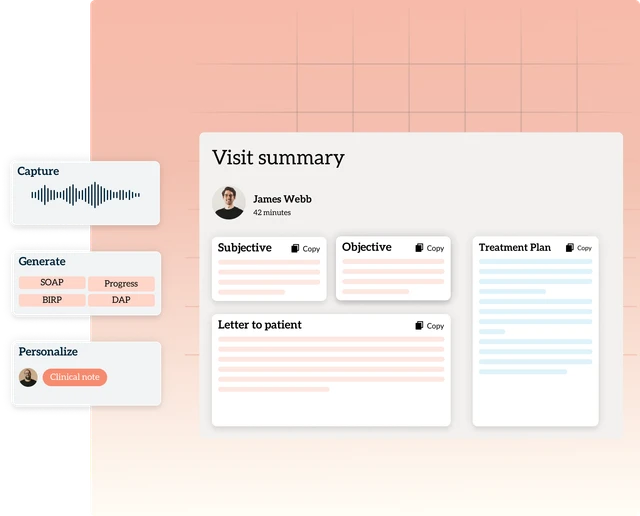In the busy world of a therapist, where time is precious and every interaction counts, the idea of using AI-powered note-taking apps to automate progress notes is like a breath of fresh air. Therapists and psychologists often find themselves bogged down by documentation and note-taking, making the promise of AI solutions incredibly enticing.
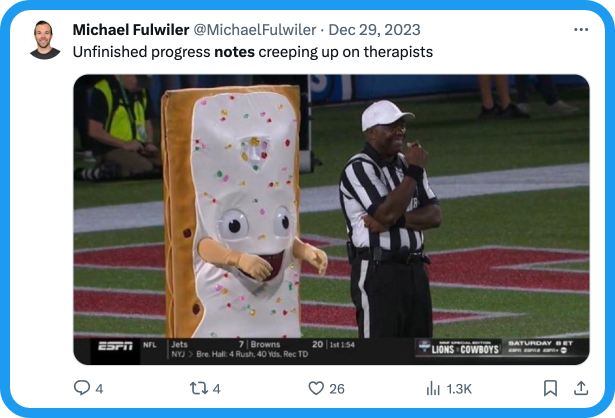
However, amidst this excitement, there’s a need to pause and consider some important questions. While AI can undoubtedly make our lives easier, are these apps really as trustworthy and reliable as they seem? Recent events have raised concerns about biases in AI systems and the privacy of patient data, highlighting the need for caution.
In this blog, we’re going to take a closer look at various AI note-taking apps. Our goal is to help mental health practitioners understand the pros and cons of these tools so they can make informed decisions. From ease of use to ethical considerations, we’ll explore it all. So, let’s dive in and see what the future holds for note-taking in mental health care.
Eleos Scribe
Eleos Scribe is the AI documentation assistant which aims to simplify the documentation process, allowing behavioral health practitioners to focus more on patient care. It works for both in person and telehealth based sessions across individual and group session formats.
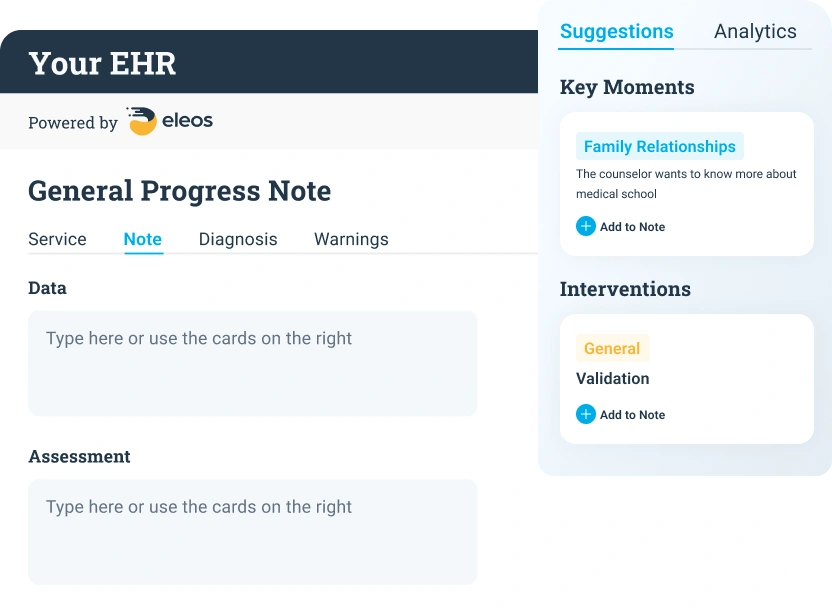
Strengths
- Progress Note Suggestions: Eleos offers tailored suggestions for progress notes, based on historical patterns and session-specific analysis. This feature saves time and effort for clinicians.
- Autocomplete Feature: The platform includes an autocomplete feature, predicting text to speed up documentation.
- EHR Integrations: It seamlessly overlays your EHR via a simple browser extension.
Weaknesses
- Cost Limitations: The platform may be expensive for individual practitioners or small practices.
- Assessment Integration: While Eleos does offer assessments, its implementation may be lacking, with limited options and functionality. The platform provides only a couple of assessments, which may not cover the full spectrum of needs for comprehensive patient evaluation.
Verdict
Eleos Scribe is a useful tool for larger group practices and health systems, particularly those focused on supervision. While it excels in streamlining progress note documentation, its cost limitations may be barriers for private practices and smaller group practices.
Mentalyc
Mentalyc offers effortless automated note-taking solutions tailored for mental health providers. With a focus on seamless documentation, it enables practitioners to generate comprehensive notes across various client demographics and therapy types. Whether it’s intake assessments or a range of progress note formats, Mentalyc streamlines the documentation process, allowing clinicians to devote more time to patient care.

Strengths
- Versatility: Mentalyc caters to a wide range of client demographics and therapy types, accommodating the diverse needs of mental health providers.
- Comprehensive Documentation: The platform supports various progress note formats, including SOAP, DAP, PIRP, SIRP, GIRP, BIRP, and PIE, ensuring thorough documentation of client sessions and treatment plans.
- Affordability: Mentalyc stands out for its affordability, with plans starting at just $39.99 per month per seat, making it accessible to individual practitioners and smaller practices.
Weaknesses
- Integration Limitations: Mentalyc may lack integrations with practice management software such as Simple Practice, potentially limiting its seamless incorporation into existing workflows. However, this is a common challenge faced by many AI-based progress note-taking solutions in the market.
Verdict
Mentalyc emerges as an ideal solution, particularly for independent therapists and private practitioners, owing to its affordability starting at just $39.99 per month per seat. Its user-friendly interface, comprehensive documentation support, and affordability make it an accessible and valuable tool for mental health providers seeking effortless automated note-taking.
Nabla Copilot
With its recent $24 million Series B funding, Nabla Copilot is the leading ambient AI assistant, reducing practitioner burn-out and improving patient care. Nabla uses speech-to-text technology to turn the conversation into a written transcript. It works with both in-person consultations and telehealth appointments.
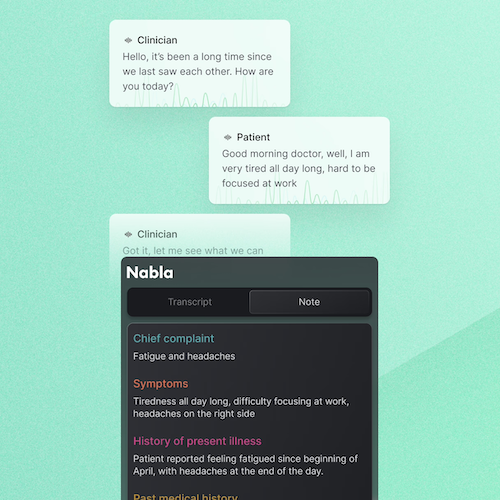
Strengths
- Personalized Format for Notes: Nabla Copilot allows clinicians to customize note formats to their preferences, including options for concise or verbose notes, or adherence to SOAP note pattern widely used in the U.S.
- Effectiveness: Nabla Copilot excels in generating accurate transcripts and useful reports, even in noisy environments, ensuring comprehensive session documentation without transcription errors.
- Not Replacing Therapists: Nabla Copilot acts as a co-pilot, aiding therapists in note-taking while preserving their autonomy. Therapists have the final say and can edit reports before filing in their EHR like Simple Practice or Session Health.
Weaknesses
- Lack of Focus: Nabla Copilot’s broad focus on serving all physicians and doctors may result in sub-par performance for behavioral health practitioners. Specialized AI note-taking software tailored specifically for behavioral health may offer more optimized solutions for this particular field.
- Cost Limitations: Priced at $119 per month, Nabla Copilot may not be feasible for individual therapists or private practitioners operating on tighter budgets. Its cost structure may be more suitable for larger health systems or practices with greater financial resources.
Verdict
Nabla Copilot offers promising features such as personalized note formats and effectiveness in transcription. However, its lack of focus on behavioral health practitioners and relatively high cost make it better suited for larger health systems rather than individual therapists or private practitioners.
Blueprint-Health
Blueprint Health is an AI-driven notetaker designed to revolutionize documentation processes by listening, transcribing, and automatically generating progress notes.
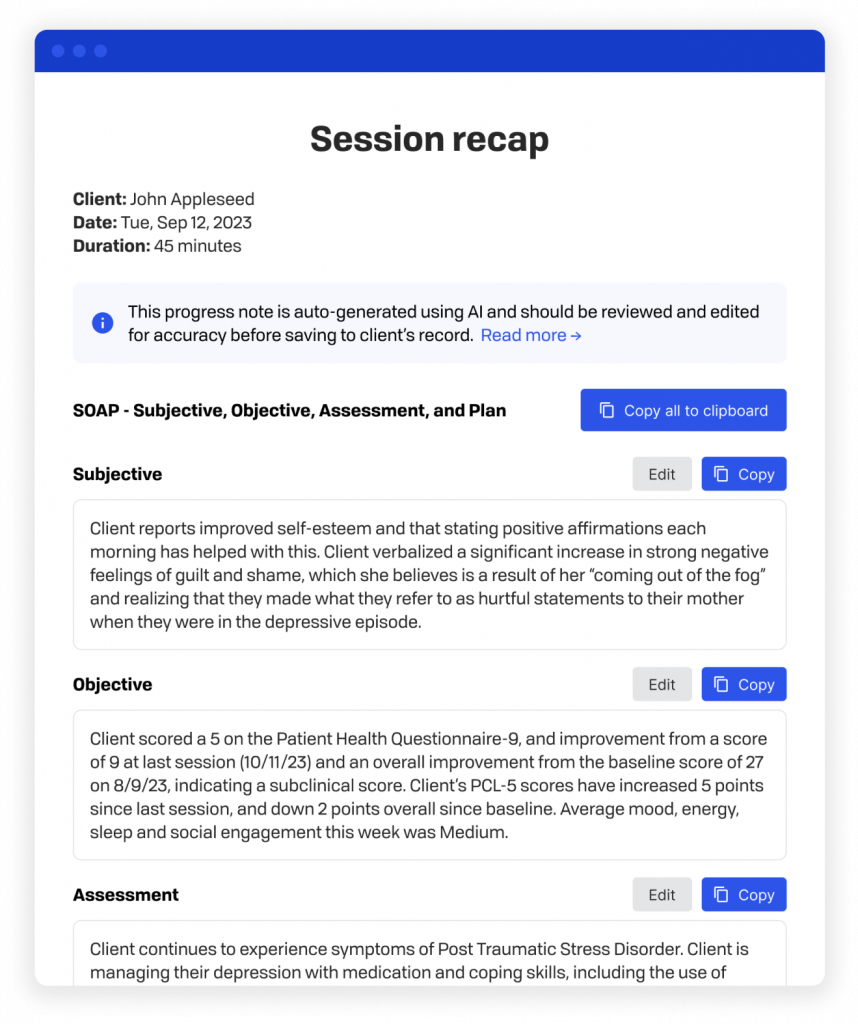
Strengths
- Therapeutic Toolkit: Blueprint Health offers a therapeutic toolkit, providing clients with digital homework, guided interventions, and a mobile app to track their progress between sessions, enhancing client engagement and continuity of care.
- Configurable Care Protocols: Practitioners can create, manage, and track care protocols within Blueprint Health, ensuring personalized and effective treatment plans for clients.
Weaknesses
- Feature Overload: With a wide range of features from AI note-taking to therapeutic toolkit and care protocols, Blueprint Health may suffer from feature overload, lacking a clear standout feature and potentially compromising usability.
- Cost Considerations: To access multiple subpar features, users may need to invest upwards of $100 per month, making it an expensive option for practitioners seeking comprehensive functionality.
Verdict
Blueprint Health offers an extensive array of features including a therapeutic toolkit and configurable care protocols. However, the platform’s feature overload and high pricing may pose challenges for practitioners seeking streamlined functionality and cost-effective solutions. Prospective users should carefully evaluate their needs and weigh the platform’s strengths against its weaknesses before making a decision.
Twofold
Twofold is an AI-powered note-taking tool designed to assist therapists in generating accurate and compliant progress, intake, SOAP notes and more. By automating transcription and generating structured progress notes, Twofold aims to reduce administrative burden and enhance clinical documentation.
Strengths
- Social Proof & Therapist Buzz: Twofold has been gaining significant traction on social media, with therapists actively sharing their positive experiences. The fact that many of these testimonials appear to be unpaid endorsements suggests that the tool is genuinely resonating with users.
Weaknesses
- Broad Focus Beyond Therapy: Twofold caters to a wide range of professionals, including coaches. While this versatility is beneficial, it may result in features and language that are not as deeply tailored to the unique needs of therapists.
- Limited Clinical Customization: Unlike some competitors that offer configurable care protocols or treatment plans, Twofold primarily focuses on transcription and note generation, which might not be enough for therapists seeking deeper clinical integration.
Verdict
Twofold is gaining organic praise among therapists, signaling strong user satisfaction. Its AI-driven note-taking capabilities offer efficiency and automation, making documentation easier. However, its broader focus on multiple professions and limited clinical customization may leave some therapists wanting more. Those seeking a streamlined, AI-powered note-taking tool should explore whether Twofold aligns with their practice needs before committing.
Freed
Freed simplifies documentation for healthcare professionals by transcribing patient visits, extracting and summarizing medically relevant information, and structuring it into the appropriate format. Acting as a digital scribe, Freed streamlines note-taking without the need for extensive training.
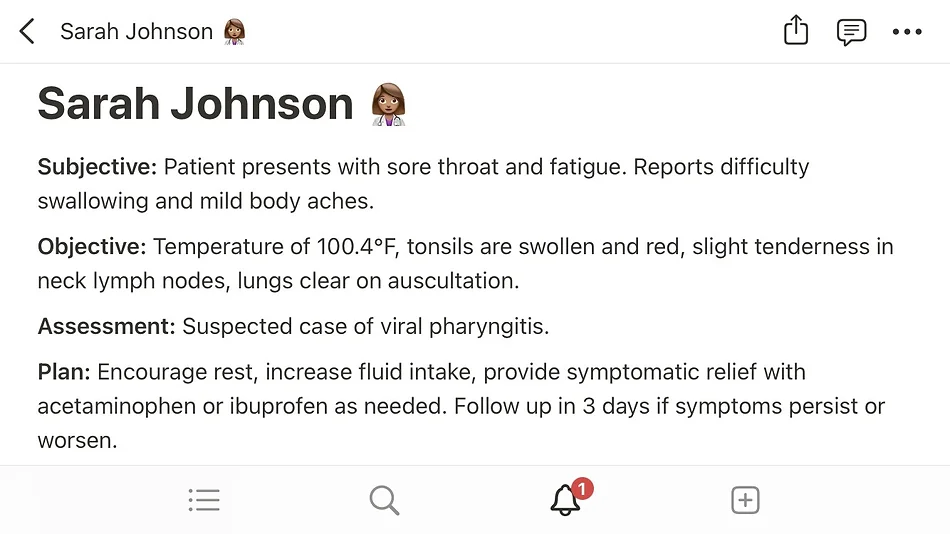
Strengths
- Focus on SOAP Note Format: Freed excels in providing structured documentation, particularly in the SOAP note format, ensuring comprehensive and organized patient records.
Weaknesses
- General Healthcare Focus: Freed’s broad focus on all healthcare professionals may compromise its effectiveness for mental health practitioners, as it may lack specialized features tailored specifically for this field.
- Cost Considerations: With a starting price of $99 per month, Freed may be expensive for independent therapists and private practices, potentially limiting its accessibility for smaller-scale practitioners.
Verdict
Freed offers a convenient solution for healthcare professionals seeking efficient documentation through its transcription and organization features. However, its general healthcare focus and higher pricing may limit its suitability for mental health practitioners, especially independent therapists and private practices. Prospective users should weigh the platform’s strengths against its limitations to determine its compatibility with their specific practice needs and budget constraints.
Upheal
Upheal is an AI-assisted platform tailored for mental health professionals, offering automated note-taking and analytics. We had covered them earlier in our blog on Mental Health Softwares for Therapists in Private Practice.
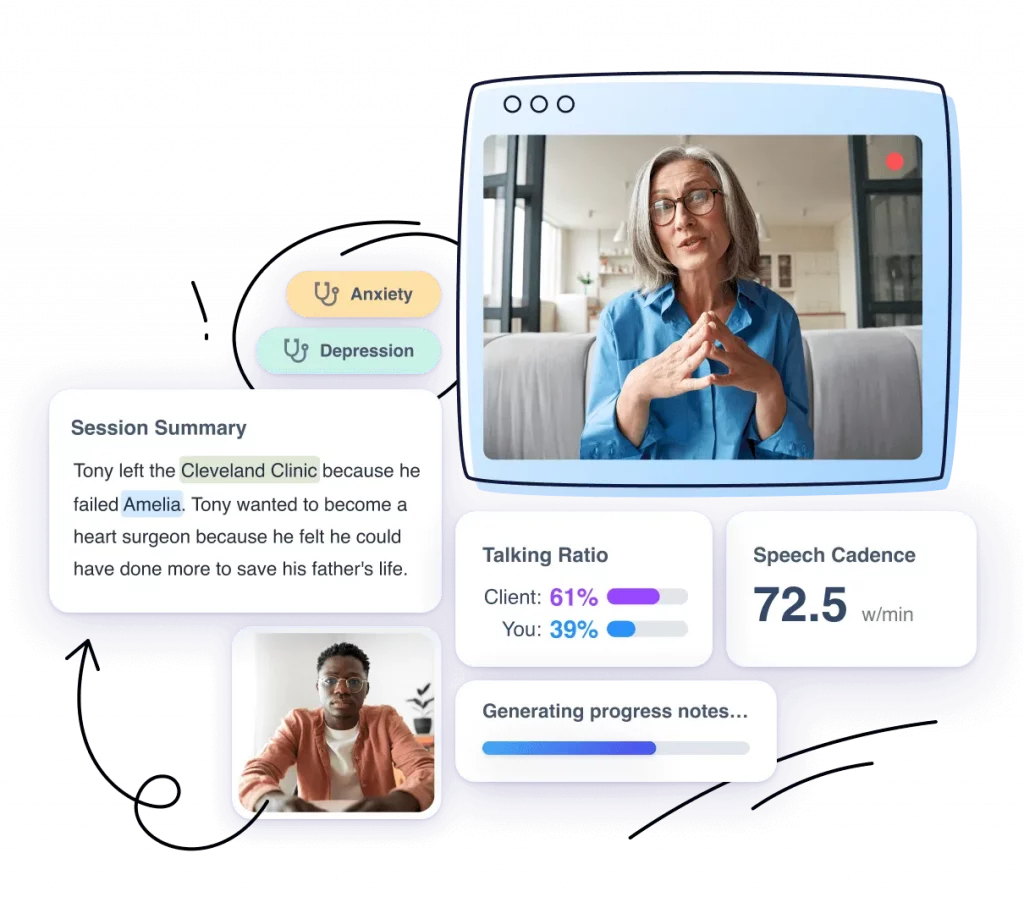
Strengths
- Comprehensive Session Documentation: Upheal’s AI assistant captures key topics, themes, symptoms, goals, and treatment plans, simplifying progress note drafting. It also supports various note styles including SOAP, GIRP, BIRP, DAP, EMDR, Mental Status Exam, and Intake.
- Integration with Google Calendar and Zoom: Seamlessly integrates with Google Calendar and Zoom, facilitating scheduling and session management. Additionally, it offers a browser extension for enhanced accessibility.
Weaknesses
- Practice Management Overreach: Upheal’s expansion into practice management functionalities akin to Simple Practice may dilute its core focus on progress notes and potentially impact the quality of its AI-generated notes.
- Cost Considerations: While plans start at $49 per month, practitioners may find that the functionality they require necessitates opting for higher-tier plans starting at $99 per month, making it a pricier option for comprehensive use.
Verdict
Upheal presents a robust solution for mental health professionals with its comprehensive session documentation capabilities and seamless integration with Google Calendar and Zoom. However, its expanding scope into practice management functionalities and pricing structure may raise concerns regarding its core AI capabilities and affordability. Prospective users should carefully assess their needs and evaluate whether Upheal aligns with their practice requirements.
Conclusion
Final Thoughts
In today’s digital age, embracing technology is imperative for independent therapists to stay relevant and effectively serve their clients. However, the selection process for adopting new software should be approached with caution and discernment. It’s essential to prioritize excellence in meeting specific needs over opting for comprehensive solutions that may dilute functionality.
For example, while platforms like Simple Practice excel in practice management, they may not offer the same level of excellence for creating your website or psychological testing. You are better off using specialised solutions for SEO friendly website or administering outcome tools. Therefore, therapists should focus on selecting software that excels in their desired purpose, ensuring optimal efficiency and effectiveness in their practice workflows.
You might want to go through our blog on mental health softwares to make an informed choice.
There’s an interesting trend in 2025 where EMRs like SimplePractice (you can even sign up for their early access here) are integrating AI note-taking—something that actually fits seamlessly into their product flow since they already handle scheduling, client management, and documentation. But what doesn’t make sense is assessment platforms like Blueprint Health and NovoPsych jumping on this bandwagon. Since they are not solving for the therapist workflow—things like appointment scheduling, client management, and session documentation—AI note-taking feels like a forced add-on that doesn’t align with their core purpose of solving for psychological assessments. From what we’ve seen, their implementations seem broken and disconnected. At PsyPack Assessments, we are not chasing trends for the sake of it. We want to be the best assessment solution. That’s why we’re doubling down on assessments, building industry-first features like group-level analytics, custom assessments with multi-scale scoring, assessments for group practices and exclusive assessments—because that’s what truly matters for psychologists. Sign up for PsyPack’s free forever Beginner plan and see for yourself!
Now, for our top pick…
Our Top Pick for AI-Based Note-Taking Apps in Mental Health Practice
In summary, after a thorough comparison of various AI-based note-taking apps, our top pick for independent therapy practices is Mentalyc. With its specialized focus on behavioral health, affordability, and versatility in supporting various note formats, Mentalyc offers a comprehensive solution tailored specifically for mental health practitioners. A close second is Upheal, which impresses with its comprehensive insights and adaptive note-taking capabilities. These two platforms stand out for their potential to streamline documentation processes, enhance clinical efficiency, and improve patient care in independent therapy practices.

